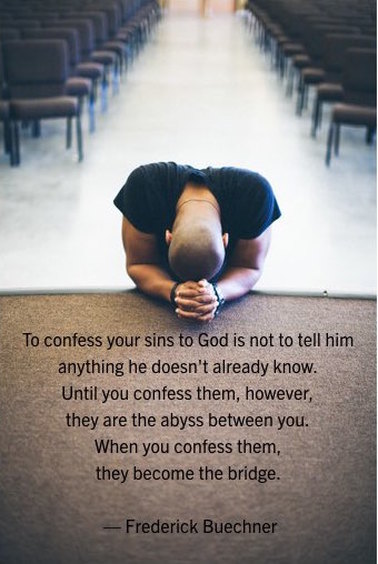 I came across a quote from C. S. Lewis that fits well with our emphasis on praying, and I had to share it with you. He explains why the real problem of the Christian life comes where we don’t usually look for it: "It comes the very moment you wake up each morning. All your wishes and hopes for the day rush at you like wild animals. And the first job each morning consists simply in shoving them all back; in listening to that other voice, taking that other point of view, letting that other larger, stronger, quieter life come flowing in. And so on, all day. Standing back from all your natural fussings and fretting; coming in out of the wind.” — C. S. Lewis, Mere Christianity That "other point of view”? We serve a loving God who will bring all his people into his good purposes, and bring us all to himself one day for a celebration. Let’s ponder this until we can see it in action in us. What will your tomorrow morning be like? Here’s the C. S. Lewis quote from Sunday’s sermon on the Christian practice of confession. Confessing our sins to a trusted friend breaks the trajectory of self-centeredness, and restores to us a winsome humility. Self-centeredness ruins us all until and unless we own up to what we’ve done and what we’ve left undone.
Good and evil both increase at compound interest. That is why the little decisions you and I make every day are of such infinite importance. The smallest good act today is the capture of a strategic point from which, a few months later, you may be able to go on to victories you never dreamed of. An apparently trivial indulgence in lust or anger today is the loss of a ridge or railway line or bridgehead from which the enemy may launch an attack otherwise impossible. — from Mere Christianity God, grant me the serenity
to accept the things I cannot change, A deep part of what it means to be human is to live with limits. I cannot fly. You cannot change your height. You cannot change the direction of the wind. This prayer is not a self-help way to talk ourselves into trying harder or being better; it asks God to give the gift of being able to live with what is beyond our control. It is thus a prayer that starts with humility, as all praying must. the courage to change the things I can, Sometimes it is hard to believe we can make a difference for good in this world. By God’s grace we can. Love and work require courage — doing the right thing, the loving thing, the unselfish thing — so ask! and the wisdom to know the difference. Frustrated? You may be trying to change things or people that cannot be changed. Unhappy? You might be wrongly assuming that there is nothing you can do about your situation. If any of you lacks wisdom, you should ask God, who gives generously to all without finding fault, and it will be given to you. (James 1:5) So talk to God, and then take another look at your day. At Christchurch this summer we’re trying out various spiritual disciplines (sometimes called spiritual practices) to see which of them God will use to transform our character. The goal of any discipline is not to become excellent in the discipline, but to become excellent in something higher and deeper. You practice your golf swing merely to give you a better looking swing, but to make you a better golfer. Practicing the scales is a means by which you can become a better musician. And better music makes the world a better place.
This week’s practice is a particular kind of praying — a simple prayer to be prayed again and again. Many people are familiar with “The Serenity Prayer” in its short form. I heartily recommend the longer form found below. The purpose of prayer is to connect us to God, to open a two-way channel for him to bless, guide, and correct as he sees fit. The Serenity Prayer is not an end in itself, but a means to a more effective life of loving God and neighbor. Pray it morning and night for the rest of the week. Let it begin to shape how you see your world: a place of limits and opportunities which require much wisdom, wisdom which God so freely grants to those who seek him. God, grant me the serenity to accept the things I cannot change, the courage to change the things I can, and the wisdom to know the difference. Living one day at a time, enjoying one moment at a time; accepting hardship as a pathway to peace; taking, as Jesus did, this sinful world as it is, not as I would have it; trusting that You will make all things right if I surrender to Your will; so that I may be reasonably happy in this life and supremely happy with You forever in the next. Amen. How can we have peace when everything is changing?
While they were still talking about this, Jesus himself stood among them and said to them, “Peace be with you.” (Luke 24:36) The disciples were gathered together discussing the various reports of the empty tomb and the mysterious appearances and disappearances of Jesus. Then he stood there among them. How unsettling! The previous few days had been full of things the disciples would not have chosen: conflict with the Jewish leaders, betrayal, arrest, cowardly reactions to that arrest, the humiliation and death of their beloved Jesus. How overwhelming! Jesus’ ride into Jerusalem did not bring in a military kingdom to subdue the Roman sword. Jesus’ resurrection did not banish trouble from the disciples’ lives. In some ways, their circumstances got more difficult. And yet every one of the disciples (except Judas) would tell you it was worth it. Peace I leave with you; my peace I give you. I do not give to you as the world gives. Do not let your hearts be troubled and do not be afraid. (John 14:27) Jesus himself was their peace. When he stood there among them, they knew all was not lost. At the end of the 40 days they learned that his physical presence would not always be with them, but God would be with them in a new way. The events that unfold in the book of Acts show that the presence of God in their lives was even more powerful after the coming Holy Spirit. Did things settle down after the resurrection? After Jesus’ ascension into heaven? After the coming of the Holy Spirit? No, no, and no. Over the next several days let’s look at how the lives of the early Christians unfolded after Jesus sent the Holy Spirit. Was it peaceful? Hold on to your hat! It is not hard to imagine how the disciples felt the morning after Jesus’ death: afraid, stunned, confused, immeasurably sad. Maybe angry, too. Afraid because Jesus had been crucified by Rome, and Rome always dealt harshly with rebellions. Would the disciples and their families be sought out next? Stunned because the overwhelming acclaim Jesus received at the beginning of the week did him no apparent good by the end of the week. Confused because Jesus had no backup plan in case the Jewish leaders came to arrest him. Immeasurably sad because the best person anyone had ever known died a humiliating death before their eyes. Angry? Political intrigue and power-mongering among the Jewish leaders led to the death of an innocent man. Besides, being angry is easier than being sad. That is how I imagine they felt, but what did they do? The women who had come with Jesus from Galilee followed Joseph and saw the tomb and how his body was laid in it. Then they went home and prepared spices and perfumes. But they rested on the Sabbath in obedience to the commandment. (Luke 23:55–56) What they did was observe the Sabbath from Friday sunset until Saturday sunset. They observed it by praying together, eating a Sabbath meal (if they could eat at all), and refraining from work. Their habits of faith shaped their lives even in their worst moments. We need a faith like theirs based not only on emotion, not only on good or right ideas, but based on habits that reinforce our intention to honor God. Habits that can keep us on the right track (or nearly so) even when chaos and sorrow overwhelm us. What habits would you like to have in place to sustain you? Study, prayer, fellowship, worship, making music, walking while talking with God are some examples. What’s your next step toward one of those habits? And hang on until tomorrow. He said he would rise on the third day…. The events of Thursday of Holy Week start quietly, but are part of a series of events that changed world history.
Jesus gathered his disciples, and gave them an object lesson, a multi-sensory learning exercise. He washed their feet! It was just before the Passover Festival. Jesus knew that the hour had come for him to leave this world and go to the Father. Having loved his own who were in the world, he loved them to the end. The evening meal was in progress, and the devil had already prompted Judas, the son of Simon Iscariot, to betray Jesus. Jesus knew that the Father had put all things under his power, and that he had come from God and was returning to God; so he got up from the meal, took off his outer clothing, and wrapped a towel around his waist. After that, he poured water into a basin and began to wash his disciples’ feet, drying them with the towel that was wrapped around him. ... When he had finished washing their feet, he put on his clothes and returned to his place. “Do you understand what I have done for you?” he asked them. “You call me ‘Teacher’ and ‘Lord,’ and rightly so, for that is what I am. Now that I, your Lord and Teacher, have washed your feet, you also should wash one another’s feet. I have set you an example that you should do as I have done for you. Very truly I tell you, no servant is greater than his master, nor is a messenger greater than the one who sent him. Now that you know these things, you will be blessed if you do them. (John 13:1–5,12-17) There is no question about the point that Jesus is making about the priority of sacrificial love among his followers. He pronounced, "Now that you know these things, you will be blessed if you do them “ not from the elevated pulpit of a cathedral but in a room where all sat together. There is no position among those who follow Jesus that exempts us from serving. There is no other priority that excuses us from loving each other. “A new command I give you: Love one another. As I have loved you, so you must love one another. By this everyone will know that you are my disciples, if you love one another.” (John 13:34–35) Our lives, families, congregations, and communities are all better off because we attempt to live in response to this gracious command. "We love because he first loved us." (1 John 4:18–19) Lord Jesus, thank you for loving us so completely! Help us to love like you love. Amen. The Gospels do not record exactly what Jesus was doing on Wednesday of that last week of his life — the life before his death before his resurrection. Luke 19, however, reports that every day he was teaching in the temple. Another excerpt, then:
Keeping a close watch on him, [the teachers of the law and the chief priests] sent spies, who pretended to be sincere. They hoped to catch Jesus in something he said, so that they might hand him over to the power and authority of the governor. So the spies questioned him: “Teacher, we know that you speak and teach what is right, and that you do not show partiality but teach the way of God in accordance with the truth. Is it right for us to pay taxes to Caesar or not?” He saw through their duplicity and said to them, “Show me a denarius. Whose image and inscription are on it?” “Caesar’s,” they replied. He said to them, “Then give back to Caesar what is Caesar’s, and to God what is God’s.” They were unable to trap him in what he had said there in public. And astonished by his answer, they became silent. (Luke 20:20–26) They fell silent because they tried to fool Jesus but could not. He sensed their duplicity and called them on it, and neatly avoided their intended dilemma. There was nothing left to say. They should have kept silent to begin with! Earlier in Jesus ministry he had compassion and healed many in a large crowd. Matthew recorded this in his chapter 12, and cited Isaiah: A bruised reed he will not break, and a smoldering wick he will not snuff out, till he has brought justice through to victory. (Matthew 12:20) Jesus had compassion, but he was not soft. As we see in the episode of Caesar’s coin above, Jesus had no compassion on those who sought to be deceitful, and so here are our lessons: Do not be afraid to come to Jesus when you are in need, whether that need is to be healed, or to be freed from your own sin, or from the effect of someone else’s sin. A bruised reed he will not break. Do be afraid of trying to deceive Jesus. Do not whitewash, manipulate, or lie to him. He will see through it, and leave you behind. You will find yourself on the wrong end of justice. Jesus is the truth. Lord, silence my lying tongue, quiet my foolish mind, and let me feel the depth of my need for you. Be merciful to me, a sinner. Then by the mercy of your life and death and life again set me free to follow you. Amen. Many of us know that the shortest verse in the Bible is John 11:35, “Jesus wept.” But do you know that this is not the only time the Bible records Jesus weeping? Jesus entered Jerusalem knowing that he would die within a few days, and he wept over the city and its inhabitants. As he approached Jerusalem and saw the city, he wept over it and said, “If you, even you, had only known on this day what would bring you peace—but now it is hidden from your eyes." (Luke 19:41–42) The inhabitants of Jerusalem had had many opportunities to respond to what God was doing in Jesus during the course of his ministry. He clearly demonstrated that God was at work through him in a way no one had ever seen. His reputation spread throughout the countryside and within the city itself. Most chose to marvel, but few followed. When Jesus’ arrived in the city, he was heralded as Messiah from the kingly family of David. The crowds hoped he would begin to put things right politically and economically. Jesus knew that his arrival was not the beginning of a new era of political peace, but the inauguration of a new way to be reconciled to God. He came to win the hearts of Israel back to his Father. He wept because most wanted something far less than God was offering. Jesus wept over the inhabitants of Jerusalem because they missed what God was doing among them. What is God doing among us? What would it take for us to see what he’s up to? Lord, help us to see what the Israelites did not. Remove our blindness, whatever it might be. Amen. |
Pastor MarkPastor Mark loves his wife and grown children, the Word of God, and words. And coffee, chocolate chip cookies, Apple products, small video projects, and the New England Patriots. Archives
June 2024
Categories
All
|


 RSS Feed
RSS Feed